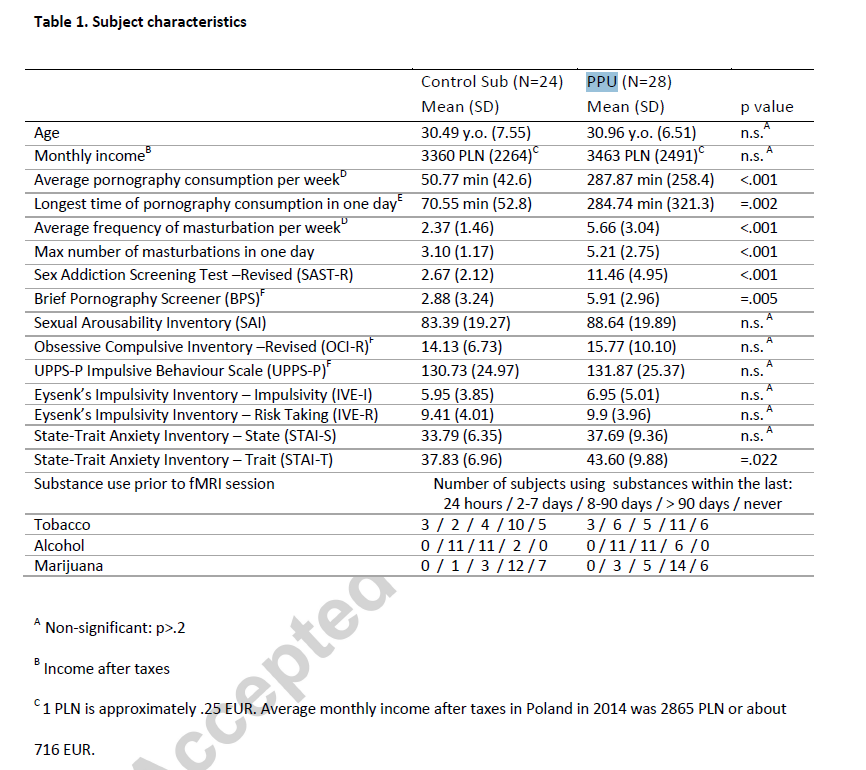Some recent research not highlighted in the accepted answer backs it up even more, quoting a popsci summary of if:
In research invited for submission to the journal Socioaffective Neuroscience of Psychology, authors Steele, Staley, Fong and Prause used EEG testing to examine the effects of visual erotica, on the brains of people who felt they had problems controlling their porn use. 52 sex addicts, including men and women, had their brain’s electrical activity examined while they looked at erotic imagery. Sex addiction theory predicts that these individuals would show brain patterns consistent with that of cocaine addicts, who demonstrate specific electrical changes in the brain’s activity, in response to drug-related cues. Sex addiction proponents, from Rob Weiss to Carnes have long argued that sex and porn are “like cocaine” in the brain.
But, when EEG’s were administered to these individuals, as they viewed erotic stimuli, results were surprising, and not at all consistent with sex addiction theory. If viewing pornography actually was habituating (or desensitizing), like drugs are, then viewing pornography would have a diminished electrical response in the brain. In fact, in these results, there was no such response. Instead, the participants’ overall demonstrated increased electrical brain responses to the erotic imagery they were shown, just like the brains of “normal people” as has been shown in hundreds of studies.
So if porn is addictive, it's not in the same way as cocaine etc., at least as far as EEG measures are concerned. The actual paper is also free in PMC.
The caveat to all such porn studies is that they have been surprisingly few in number.
Also hypersexuality is more often treated off-label (because there are no FDA-approved drugs for it) with SSRIs, which increase serotonin, rather than with drugs acting directly on dopamine, although naltrexone (an antagonist of the opioid receptor, so at least having something to do with addiction) has been also been tried. But there's not much in the way of studies of that either, and an effort to include hypersexuality in DSM-5 failed.
Perhaps the main pharmacological indicator that dopamine is somehow implicated comes from medicated patients with Parkinson's disease; some develop hypersexuality (and quite a few other behavioral issues like excessive gambling) as a side-effect of being treated with L-dopa, a dopamine precursor that turns into actual dopamine in the brain. However, fairly recent (2012) research indicates that at the usual therapeutic doses L-dopa does nothing of the sort in healthy volunteers. Testing higher doses "will be difficult, though, since higher doses of all currently available drugs that selectively augment DA neurotransmission are limited by side effects such as nausea, vomiting, dizziness and drowsiness."
One very recent (2017) Polish fMRI study found that
men with and without PPU [= problematic pornography use] do not differ in striatal reactivity and hedonic values either for erotic or monetary rewards. The key difference
between these two groups is in striatal reactivity (and accompanying behavioral reactions) in response for cues.
So (amusingly) yourbrainonporn turned out just the same for all, yourbrainanticipatingporn is different for some. Although this may sound reassuring, the wanting-difference part is however consistent with the incetive salience theory of addiction.
So the (addiction) question may come down to whether you think behavioral issues like gambling disorder are (or aren't) addiction. I note that the accepted answer implies that behavioral addictions aren't addictions, but this is not the prevailing opinion in the DSM-5, which recategorized gambling disorder from an impulse control disorder to an addiction. There's even an official blurb about this in their change summary
An important departure from past diagnostic manuals is that the substance-related disorders chapter
has been expanded to include gambling disorder. This change reflects the increasing and consistent
evidence that some behaviors, such as gambling, activate the brain reward system with effects similar
to those of drugs of abuse and that gambling disorder symptoms resemble substance use disorders to a
certain extent.
The reason why the other proposed behavioral addictions didn't get included was the lack of enough empirical evidence in their favor as such. (Internet gaming disorder was included in the "for future research" section with a passing mention that it might rise to the level of an addiction in some extreme cases.)
Anyway, here's a table with the Polish study participants' other group characteristics:

(I snipped some of the really long and boring methodological footnotes.)
One interesting (but rather obvious) fact is that more porn correlated with more masturbations. It's not at all clear what's the cause and what the effect though. Do they watch more porn because they want to masturbate more, or is it the other way around, i.e. watching more porn turns them on so they masturbate more? In other words, is PPU just the low-hanging-fruit manifestation of hypersexuality or is it really an addiction to porn? As the song goes, more research is needed.

